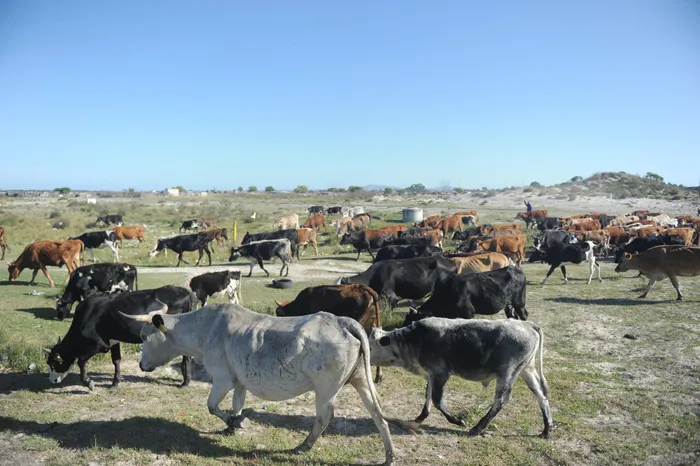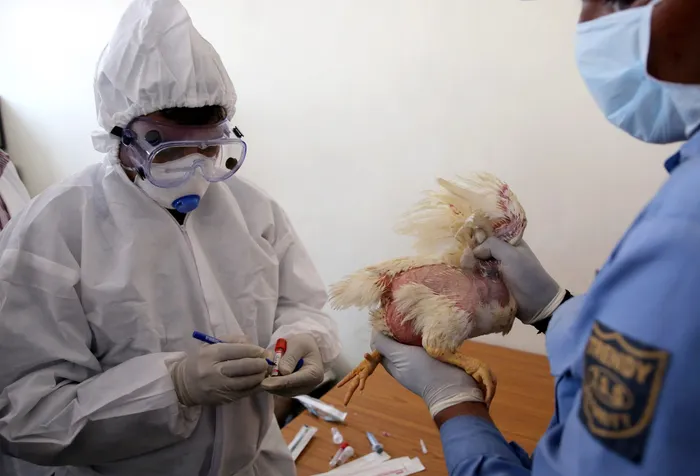Meat shortages could hit your wallet hard

Karan Beef confirms a case of Foot-and-Mouth Disease at its feedlot
Image: Ayanda Ndamane Independent Newspapers

Aviation flu could impact the price of poultry in South Africa.
Image: File
SOUTH African consumers may face higher meat prices this winter as outbreaks of foot-and-mouth disease, an avian flu-related ban on Brazilian poultry imports, and financial turmoil in the local poultry sector tighten supply.
Prices of mechanically deboned meat (MDM) have already surged by 140%, pushing up costs for processed products like polony, while disruptions in the beef sector create a complex picture for meat affordability, posing particular challenges for lower-income households.
Gordon Nicoll, chairperson of the South African Meat Processors Association (SAMPA), outlined the challenges: “We’re currently facing a serious supply issue when it comes to raw materials, specifically mechanically deboned meat from Brazil. The problem isn’t just about price anymore; it’s about whether you can get stock at all. That’s the first issue.”
Mechanically deboned meat is essential in the production of affordable processed meat products such as polony, viennas, russians, and tinned corned beef, which are staples for many South African households.
Domestic production of MDM is minimal, making the country heavily reliant on imports, primarily from Brazil.
“South Africa imports about 19 000 tons per month,” Nicoll said. “Brazil was the last open source. Now that is closed too, and other suppliers cannot meet our demand.”
The suspension of Brazilian poultry imports since May 15, 2025, following an outbreak of bird flu in Rio Grande do Sul, has resulted in a shortage of MDM and increased prices.
“The price of mechanically deboned chicken has increased by 140% since the Brazilian import ban,” said Imameleng Mothebe, CEO of the Association of Meat Importers and Exporters (AMIE).
“Every day with no imports is another nail in the coffin of food security for millions.”
At the same time, the outbreak of foot-and-mouth disease in South Africa has severely affected the beef sector. A confirmed case at a feedlot in Heidelberg, Gauteng, led to quarantine measures that cut animal slaughtering by nearly 75%.
Despite the outbreak, Wandile Sihlobo, chief economist at the Agricultural Business Chamber of South Africa (Agbiz), reassured consumers about food safety and supply.
“Although foot-and-mouth disease is a serious concern for producers, beef products are safe and consumers should not be alarmed,” he said.
Sihlobo explained that because South Africa is typically a net exporter of beef, export suspensions result in increased domestic supply, which could place downward pressure on prices in the short term.
However, producers bear the economic burden.
“Export bans force farmers to hold cattle longer, increasing feed and care costs,” Sihlobo noted.
Minister John Steenhuisen announced that the Department of Agriculture has ordered vaccines to cover the KwaZulu-Natal area, while assessments, as well as forward and backward tracing of the outbreak in Gauteng, are ongoing.
"Over 900 000 doses of vaccines were ordered, and the first batch is expected to arrive next week.
“These plans are not only about responding to outbreaks, but also about building permanent infrastructure to manage future risks.
“More broadly, we are establishing a Biosecurity Council that will bring together the South African Police Service (SAPS), veterinarians, scientists, the Border Management Authority, and industry. We are rolling out a farm-to-fork national traceability system for livestock.”
The department is also preparing to establish a Biosecurity Council to improve disease surveillance and control.
Red Meat Industry Services (RMIS) will open a centralised Operational Centre on June 9, 2025, to coordinate the FMD response.
The centre will lead efforts in vaccination, movement control, and collaboration with government and industry stakeholders.
“RMIS was established precisely for a time like this, to provide coordinated leadership and technical expertise,” said RMIS CEO Dewald Olivier.
The plan includes expanding veterinary service capacity and creating FMD-free livestock compartments to secure supply chains.
The poultry industry is further challenged by the recent business rescue of Daybreak Foods, one of South Africa’s largest integrated poultry producers, which had to cull 350,000 chicks amid financial difficulties.
This has compounded supply pressures on chicken products.
Arnold Prinsloo, CEO of Eskort, called the combined impact of foot-and-mouth disease, the Brazilian import ban, and the Daybreak poultry crisis a “triple whammy” for food security. “Meat is going to be more expensive for everyone this winter, but many people will also face the threat of hunger and malnutrition,” he warned, urging government to ease the ban by allowing imports from unaffected regions.
The Department of Agriculture has committed to reviewing Brazil’s regionalisation application and considering a partial lifting of the import suspension.
“We are following international guidelines which allow trade from zones free of avian influenza,” Steenhuisen said.
This approach is aimed at protecting both animal health and food supply stability.
Related Topics: